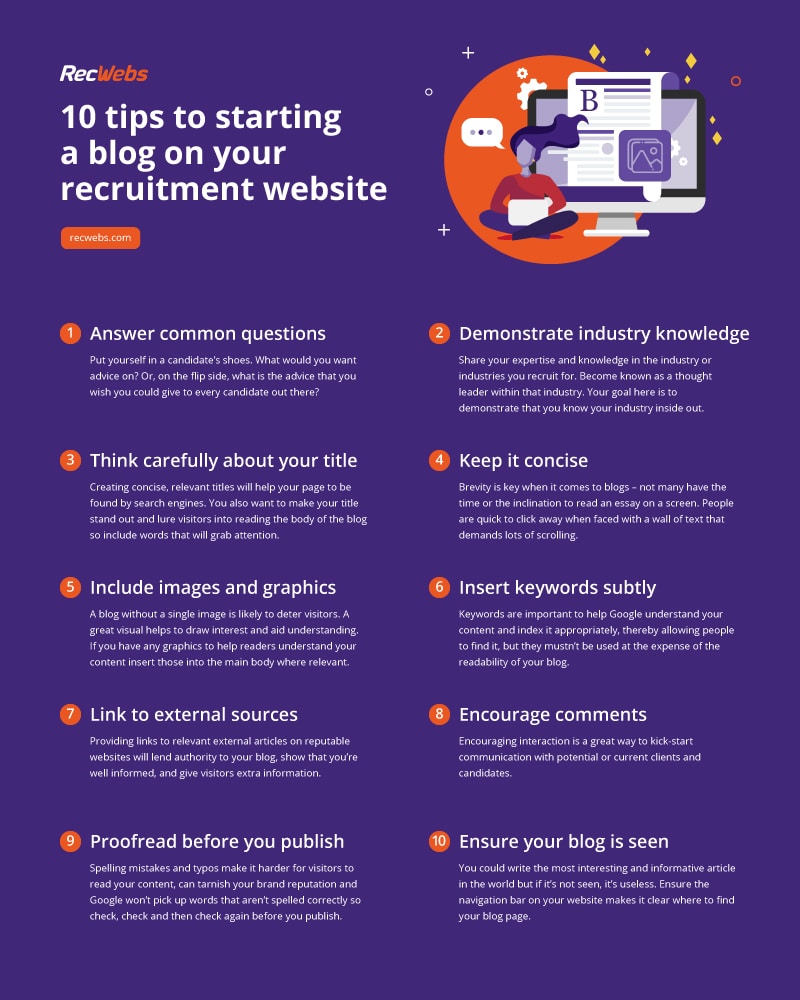So you’ve decided to start a blog page on your recruitment website? Smart move. Content marketing has become one of the most effective and inexpensive strategies to increase your online presence, boost your brand, establish expertise and authority, drive traffic to your website, and generate new client and candidate leads.
If you’ve not written a blog before it can be a daunting prospect but just remember that you are an expert in your field. Write about what you know, word it carefully and candidates and clients alike will come to your website organically.

Answer common questions in candidate-focused blogs
Put yourself in a candidate’s shoes. What would you want advice on? Or, on the flip side, what is the advice that you wish you could give to every candidate out there? Would you like to help candidates ace their interviews? Perhaps you’ve been sent some CVs that could do with some work and you want to pass on some tips? Maybe you’d simply like to share some confidence techniques. This is the perfect place for it. Just focus on a single topic per blog to keep it targeted.
Demonstrate industry knowledge in client-focused blogs
Share your expertise and knowledge in the industry or industries you recruit for. Become known as a thought leader within that industry. Your goal here is to demonstrate that you know your industry inside out. You could comment on industry news and trends, discuss relevant research on candidate personas, or suggest solutions to current recruiting challenges.
Think carefully about your title
In order for Google to index a page it needs to understand what it is about. Creating concise, relevant titles will help your page to be found by search engines. Ensure the title of the blog contains keywords that visitors may be searching for. You also want to make your title stand out and lure visitors into reading the body of the blog so include words that will grab attention.
Keep it concise
Brevity is key when it comes to blogs – not many have the time or the inclination to read an essay on a screen. People are quick to click away when faced with a wall of text that demands lots of scrolling. Answer the question that your blog has set out to tackle, pack it full of interesting and relevant information but don’t exceed 700 words. Use bullet points and sub-headings to break your text up and avoid overwhelming your reader.
Include images and graphics
A blog without a single image is likely to deter visitors. A great visual helps to draw interest and aid understanding. If you have any graphics to help readers understand your content insert those into the main body where relevant. Adding images into the blog text can also help to break up a longer article, making it easier to read.
Insert keywords subtly
Keywords are important to help Google understand your content and index it appropriately, thereby allowing people to find it, but they mustn’t be used at the expense of the readability of your blog. Incorporate them seamlessly into your copy, ensuring they’re in both the main title and the body of the text.
Link to external sources
Providing links to relevant external articles on reputable websites will lend authority to your blog, show that you’re well informed, and give visitors extra information. If you’re including statistics or quotes, always link back to the source.
Encourage comments
Encouraging interaction is a great way to kickstart communication with potential or current clients and candidates. Have a comments section set up on your blog page and ask questions within your articles to get people talking.
Proofread before you publish
Spelling mistakes and typos make it harder for visitors to read your content, can tarnish your brand reputation and Google won’t pick up words that aren’t spelled correctly so check, check and then check again before you publish.
Ensure your blog is seen
You could write the most interesting and informative article in the world but if it’s not seen, it’s useless. Ensure the navigation bar on your website makes it clear where to find your blog page and include recent and/or similar articles on a sidebar or under the copy of all your articles. Add it to your socials too, linking back to your blog page. If you distribute a regular newsletter, add a link to your most recent ones on that.
The first blog you write will be the hardest but once you get started you’ll find a format that suits you and the more you write, the better you get at it. Consistency is key – consider setting up a schedule so that you remember to post content regularly. It’s also worth making a note of any blog idea that pops into your head or copying the link to an interesting external article or important news item. Bring visitors in with a great blog, keep them coming back with regular posting, and see your conversions increase and your reputation grow.





